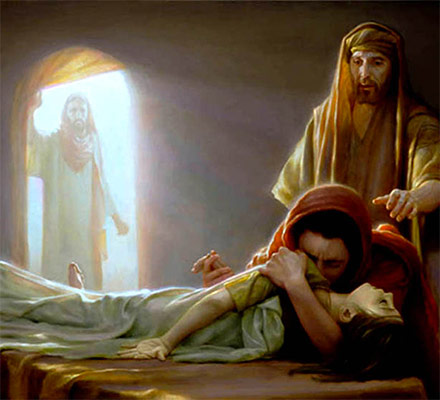This Sunday is Laetare Sunday. Laetare comes from the entrance antiphon for today’s liturgy and means “rejoice.” The mourning of Lent is not far away from the joy of Easter. We rejoice because Christ is the Light of the World and soon that light will shine. We need to not only head toward that light but continue to let the Light of Christ illumine our actions, attitudes, and expectations.
Today’s First Reading, the last lines of the second book of Chronicles, explains why the Lord sent the Israelites into the Babylonian exile and why he ended it. The wickedness of Israel had blinded it so much to God and his Law that he turned them over to the Babylonians as punishment. They thought that building and maintaining the Temple meant they could do whatever they wanted, since it meant God was always with them. The Lord sent Jeremiah to warn them not to idolatrize the Temple; the Lord would remain with them if they were just and faithful (see Jeremiah 7:1-15). Sadly, they weren’t.
The Lord warned them through Jeremiah, but they didn’t listen, so when Babylon came the Lord delivered them into the Babylonians hands and Israel was led captive into exile. The duration of this exile was prophesied by Jeremiah to be seventy years (Jeremiah 25:9–12). Exile was the punishment proscribed in Leviticus (Leviticus 26:33-35) if the Israelites did not observe a Sabbath of the land every seventh year: during this Sabbath they were not to cultivate the land (Leviticus 25:1–7). Nobody greedy would skip a whole year of agriculture, so Israel didn’t observe this Sabbath and the Lord imposed exile as a way to allow the land to rest. Now the Lord was making them do it. Israel cannot claim they didn’t know the Lord’s will for them, but they didn’t believe Jeremiah and they didn’t listen. Despite this, the Lord also promised that the exile would end: through Cyrus and the Persians they would be able to return home. This punishment was not forever.
In today’s Second Reading Paul reminds us how much God loved us in sending his son (see John 3:16 in today’s Gospel). If Israel received salvation from the Babylonians by way of the Persians (all arranged by the Lord) we receive salvation through the grace that Our Lord earned for us on the Cross. Paul reminds us today that no one deserves the grace of salvation or mercy: it is an unmerited gift from a generous God. Paul speaks of us being raised up with the Lord, and we can understand this in two senses: being raised up on the Cross with Christ and being raised up with Christ in the Resurrection. In both cases the Lord shows the goodness and generosity of God.
Today’s Gospel we are taught by Our Lord that the bronze serpent in Moses’ time was a foreshadowing of him being raised up on the Cross so that everyone who looked upon him in faith would be saved. The sign of Moses lifting up the serpent in the desert (Numbers 21:4-9) is a story of God asking his people to show their faith in him by believing that looking upon a lifeless bronze serpent would result in something that obviously a bronze image cannot do: save them from death.
This story from Numbers was only a foreshadowing of looking up at Jesus crucified upon the Cross and believing that instead of a simple execution he is giving witness to the depth of God’s love and mercy as well as the true horror of sin. Our Lord doesn’t just want to come into the world; he wants to come into our hearts and put a spotlight on what we’d rather not see: the evil of sin. Turning from him is turning from the truth.
We all have that fear from time to time of being exposed for what we are–not as virtuous or holy as we could be or should be–yet Our Lord doesn’t come to expose us in order to condemn us; he comes to lead us back into the light, his light, the light of truth, and to save us from all the evil destructive things contained in the darkness of ignorance and falsehood. Just as we feel safer in a well-lit place at night we must live in the light of Christ, knowing he will guard us from evil and reveal it clearly so that we can avoid it.
Two weeks from today, during the narration of the Lord’s Passion, we’ll kneel for a moment when Our Lord dies on the Cross. We’ll do the same on Good Friday afternoon. Lent is a pilgrimage toward the foot of the Cross. No one likes being at the foot of the Cross. Mary and John certainly didn’t, despite their holiness, but Our Lord teaches us today that when he is raised up he’ll draw everyone to himself. The Cross is a waypoint on the path to eternal life for all of us. If we run from his Cross or from ours we know we’re headed in the wrong direction. I challenge you this week to not only head toward his Cross, but to spend some time at the foot of it. It will shed light on so many things in your life.
Readings: 2 Chronicles 36:14–16, 19–23; Psalm 137:1–6; Ephesians 2:4–10; John 3:14–21.



